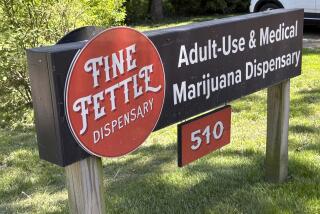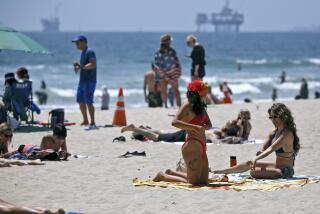U.S. Virgin Islands’ ban on harmful sunscreens to go into effect Jan. 1
- Share via
Travelers heading to the U.S. Virgin Islands may want to rethink what type of sunscreen they pack. The territory recently outlawed sunscreens with ingredients believed to harm coral reefs and other marine life. It’s not the first such law — Hawaii and Key West, Fla., have passed similar measures — but it may be the first American entity to enforce such a ban.
In June, lawmakers passed the ban that prohibits stores from stocking some types of popular sunscreens after Sept. 30, and locals and visitors from using or possessing them on Jan. 1.
“Tourism in the Virgin Islands is our lifeblood,” Gov. Albert Bryan Jr. said in a statement after signing the law in July. “[B]ut to ensure we continue to entice visitors with our world-class beaches and natural beauty in the coming years, we need to protect our coral reefs as part of our quest to initiate sustainable tourism. This is crucial all over the Caribbean, and I call on others to join me.”
The move doesn’t mean visitors will be forced to risk sun exposure.
Only products that contain the UV-blocking chemicals oxybenzone, octinoxate and octocrylene will be prohibited. Travelers instead may use reef-safe sunscreens made with minerals such as zinc oxide and titanium dioxide (here’s a list of hundreds of coral-safe sunscreens to try). They also should limit their time in the sun and wear protective clothing to shield their skin.
The U.S. Virgin Islands includes four large islands — St. Croix, St. Thomas, St. John and Water Island — as well as coral reefs around Virgin Islands National Park, Buck Island Reef and others. In making the decision, lawmakers cited scientific evidence from the National Oceanic and Atmospheric Administration indicating that “oxybenzone is deadly to coral and threatens overall reef health,” a statement said.
The EPA cites warming oceans, pollution that begins on land (including sunscreen use), trash and micro-plastics, and overfishing as other threats to reefs. The U.S. agency estimates that Caribbean reefs have lost 80% of their stony coral cover.
Similar sunscreen laws in Hawaii and Key West won’t take effect until 2021.
The island nation of Palau in the western Pacific outlawed sunscreens with harmful chemicals in 2018. It took action after a 2017 report showed that its most popular natural landmark, Jellyfish Lake, where millions of golden jellies once thrived, recorded its highest concentrations of sunscreen compounds.
More to Read
Sign up for The Wild
We’ll help you find the best places to hike, bike and run, as well as the perfect silent spots for meditation and yoga.
You may occasionally receive promotional content from the Los Angeles Times.







